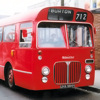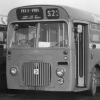Midland “Red” Motor Services (BMMO & MROC)
BMMO S23 — Overview
Introduction
The BMMO S23 was the last batch of vehicles to be designed and built by Birmingham and Midland Motor Omnibus Company Limited (Midland “Red”). They followed on from the basic design of the BMMO S21 and BMMO S22 before them, being of 6 bay construction and fitted with a BMMO 10½-litre engine coupled to SCG 4-speed semi-automatic gearbox. Rubber suspension (independent at the front) was used with disc brakes on the front wheels, and drum brakes fitted from new at the rear as disc brakes on the rear axle had proven unacceptable due to excessive pad wear when used on intensive stage carriage work. The handbrake was of the transmission type as standard on BMMO built vehicles of this era.
The type S23 represented the last Midland Red built vehicles, a tradition started with the first SOS buses built in 1923. The company had recently been taken over by the National Bus Company (NBC), but despite them largely taking the blame for the end of Midland Red’s unique tradition of vehicle building, the real reason was the company was losing money and vehicle building had to cease for the company to survive.
Production Vehicles
5916–5991 (R/Nos: RHA916G–939G & UHA940H–991H)
A total of 76 type S23 vehicles were built at Central Works, Carlyle Road, and entered service between December 1968 and June 1970, all were designed from new as service buses for use with one-man operation. They were fitted with 51 bus seats of rexine covered type with top grab rails, and top sliding ventilators as standard on service buses. Fleet numbers 5916–5923 were originally fitted with BMMO S17 style seats and converted to standard from March 1971—it is not known whether these were rexine or moquette covered.
Fleet numbers 5942–5991 were finished (paneled and fitted out) by Plaxton then returned to Carlyle Road for painting and pre-delivery inspection. Plaxton finished examples had much longer interior roof panels than Carlyle finished ones, but were otherwise identical.
Summary
The BMMO S23, being the last buses built by a company struggling both economically and with serious staff shortages, were a bit of a mixed bag. Mechanically the specification was tried and tested, with most being fitted with DPA fuel pumps rather than the CAV type previously standard (this was tested on BMMO S22, fleet number 5901, at Worcester (Padmore Street) depot before being adopted as standard). Drum brakes were fitted from new on the rear wheels for the reasons outlined above, but they stopped better with discs all round!
However, bodywise the type S23 seemed poor. The Plaxton finished examples were known for dropping the inner skin of the racks when in service, and later both Carlyle and Plaxton models were patched up with plates to cover stress cracks on the inner roof panels, outer open panel lock areas and window pans. This wasn’t a problem that other BMMO built vehicles suffered, and may be due to inferior build quality or perhaps less attention paid on major body overhauls at the “Certificate of Fitness” renewal when 7 years old.
Withdrawals and Disposals
With the sale of BMMO services and assets in Birmingham on Monday 3rd December 1973, twenty-four examples of the BMMO S23 passed to West Midlands Passenger Transport Executive (WMPTE), who continued to operated them until withdrawals began in April 1978. Examples that survived with BMMO, which renamed to Midland Red Omnibus Company Limited (MROC) on Friday 29th March 1974, were withdrawn between 1979 and 1981.
The last two examples of the BMMO S23 to be withdrawn from service were fleet numbers 5937 and 5930 (registration numbers RHA937G and RHA930G), both ending service at Rugby depot on 27th and 28th February 1981, respectively. These were also the last vehicles of any type built by BMMO to be withdrawn, and thus the long and proud history of the Midland Red operating homemade vehicles came to an end. To commemorate the occasion Midland Red produced a limited edition run of 200 post cards for 5930’s final journey from Leamington to Rugby, and this vehicle was fitted with a specially made destination blind, reading, “1923–1981 Final Day of BMMO built buses.”
After withdrawal, most examples of the BMMO built vehicles were scrapped but thankfully, enthusiasts acquired a large number of the type S23 for preservation. One significant example which is now preserved with Birmingham and Midland Motor Omnibus Trust (“The Transport Museum”—BaMMOT), Wythall ,is fleet number 5941 (registration number UHA941H) which was the last vehicle completely constructed by BMMO at their Central Works in Birmingham. Unfortunately number 5991 (registration number UHA991H), the last chassis to be built by BMMO, has been scrapped, despite being retained by Midland Red Omnibus Company Limited (MROC) at their Central Works for a number of years due to its historical significance.
Many enthusiasts regret that production of BMMO built vehicles came to an end in June 1970, but thankfully there are plenty of examples of the type S23 preserved to represent this proud era of the company’s history. Details of vehicles that passed into preservation can be found on the “BMMO S23 — Preserved Vehicles” page, while further details of the acquisition of BMMO services and assets by WMPTE can be found on the “WMPTE Transfer” page in the History section.
Related Pages
Acknowledgements
Certain information in the “BMMO S23” section was originally recorded by Arthur Homer, former body superintendent at BMMO’s Central Works. Special thanks to Arthur’s family for allowing us to use this unique information on this website. Other information in this section has been compiled by Mark Tunstall of the Worcester Bus Preservation Society.




